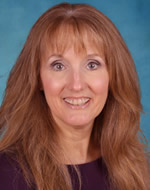Sylvia Shugrue award winner 2016
By admin
Posted on 2016-04-20
 Debra Ericksen, winner of the 2016 Shugrue Award and a science teacher at Adamsville Primary School in Bridgewater, NJ, has developed interdisciplinary, inquiry-based lessons that encourage students to pursue their curiosity about the world.
Debra Ericksen, winner of the 2016 Shugrue Award and a science teacher at Adamsville Primary School in Bridgewater, NJ, has developed interdisciplinary, inquiry-based lessons that encourage students to pursue their curiosity about the world.
Victor Hayek, Superintendent of Schools for Bridgewater-Raritan, says her “lesson plan incorporated NGSS standards and provided enhanced learning opportunities … students [were] engaged and excited throughout the lesson. They had opportunities to apply math skills to their investigations and were able to expand their content knowledge and understanding through rigorous use of informational text, research writing, and presentation of projects.”
As a member of the NGSS Teacher Leader Cohort, Ericksen has facilitated educator workshops that help teachers understand the NGSS and apply interdisciplinary instructional strategies. As a science coordinator, she introduced a new structure for the science fair where scientists and engineers serve as mentors and role models for students.
Candy Mulligan, K–4 Supervisor of Language Arts and Social Studies for Bridgewater-Raritan Schools, says, “What I find most impressive about Debra is the unique way in which she approaches her planning and instruction. She is not one to settle on doing the same thing over and over again. Each new school year Debra first seeks to understand the group of learners she has before her, and then she begins to decide how she can best meet their needs. She always strikes a balance between maintaining the integrity of the district curriculum while not being afraid to take a risk and try a different approach.”
 Debra Ericksen, winner of the 2016 Shugrue Award and a science teacher at Adamsville Primary School in Bridgewater, NJ, has developed interdisciplinary, inquiry-based lessons that encourage students to pursue their curiosity about the world.
Debra Ericksen, winner of the 2016 Shugrue Award and a science teacher at Adamsville Primary School in Bridgewater, NJ, has developed interdisciplinary, inquiry-based lessons that encourage students to pursue their curiosity about the world.
Exemplary science teaching leads to better assessment of student learning
By Robert Yager
Posted on 2016-04-18
Too often science teachers focus on the information included in textbooks and a specific curriculum. But these resources do not include Exemplary Science Teaching. The Next Generation Science Standards (NGSS) continue to focus on conventional ideas and reforms, as well as the Big Ideas. Too little has been focused on strengthening pedagogy and how it improves student learning. The following ten characteristics outline exemplary science teaching and create an atmosphere in which students succeed:
- Work with students to include their interests and ideas.
- Encourage students to work in teams of two to four students to deal with questions.
- Focus on student questions and issues with activities that are local, current, and personal.
- Understand and respond to individual student interests, strengths, experiences, and needs.
- Focus on student understandings and use of information, ideas, and inquiry processes.
- Guide students working in groups with active and extended inquiries.
- Provide opportunities for discussion and debate among students.
- Share responsibilities for learning with students.
- Support classroom communities with cooperation and respect.
- Work with other teachers to enhance the whole school science program.
Robert E. Yager
Professor of Science Education
University of Iowa
Too often science teachers focus on the information included in textbooks and a specific curriculum. But these resources do not include Exemplary Science Teaching. The Next Generation Science Standards (NGSS) continue to focus on conventional ideas and reforms, as well as the Big Ideas. Too little has been focused on strengthening pedagogy and how it improves student learning. The following ten characteristics outline exemplary science teaching and create an atmosphere in which students succeed:

